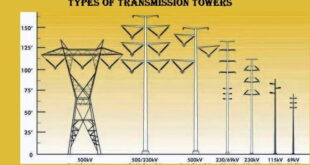Introduction To Transmission Lines Introduction: Transmission lines, the unsung heroes of modern infrastructure, serve as the critical conduits for the efficient flow of electrical power and communication signals. These intricate networks of cables and conductors form the lifelines that power homes, businesses, and industries while enabling global connectivity through data …
Read More »Tag Archives: Power Transmission
Types of Transmission Towers
Types of Transmission Towers: Exploring Designs, Advantages, and Applications Introduction Transmission towers, often overlooked but integral to the power grid, come in various forms, each designed to meet specific requirements of power transmission. In this in-depth exploration, we will delve into five primary types of transmission towers, examining their designs, …
Read More »Why are overhead transmission lines not insulated?
Answer: Overhead transmission lines are not insulated primarily because insulation is unnecessary and impractical for high-voltage lines. Insulation adds complexity, cost, and maintenance challenges without significant benefits. Reasoning: Economical Considerations: Installing insulation on overhead lines is costly and doesn’t justify the added expense for the benefits gained in most scenarios. …
Read More »Why is transmission line 11KV OR 33KV, 66KV not in 10KV, 20KV, or 30KV?
Answer: Transmission line voltages like 11kV, 33kV, and 66kV are standard designations based on practical considerations, system requirements, and historical conventions. These values optimize efficiency, cost, and technical feasibility. Reasoning: System Compatibility: Standardizing transmission voltages promotes system compatibility, facilitating the interconnected operation of power grids and ensuring efficient energy transfer. …
Read More »Why current is better than voltage?
Answer: Current is not inherently “better” than voltage; they are different aspects of electrical systems. Current and voltage are interdependent, and their relationship is defined by Ohm’s Law (V=IR). However, the choice between emphasizing current or voltage depends on the specific application and requirements of the electrical system. Reasoning: The …
Read More »What matters more current or voltage?
Answer: Both current and voltage are important in electrical systems, but their significance depends on the context. In general, neither matters more than the other; they are interrelated through Ohm’s Law (V = I * R). The importance of current or voltage depends on the specific application and the characteristics …
Read More »Why transformer is not used in DC?
Answer: Transformers are not used in direct current (DC) systems because they rely on the principle of electromagnetic induction, which requires a changing magnetic field to induce voltage and current in the secondary winding. In a DC system, the current flows in a constant direction, creating a steady magnetic field …
Read More »Which Current Is More Dangerous AC or DC?
Which Current Is More Dangerous AC or DC? Answer: In terms of physiological effects on the human body, AC (Alternating Current) is generally considered to be more dangerous than DC (Direct Current) at certain frequencies and amplitudes. This is primarily due to the “let-go” phenomenon and the potential for sustained …
Read More »What is Difference between AC and DC Transmission System?
Answer: The main difference between AC (Alternating Current) and DC (Direct Current) transmission systems lies in the direction of current flow. AC changes direction periodically, while DC maintains a constant flow in one direction. Reasoning: Current Direction: AC changes direction continuously, while DC maintains a constant direction. Voltage Levels: AC …
Read More » Electrical Engineering World Wiring a Brighter Tomorrow!
Electrical Engineering World Wiring a Brighter Tomorrow!








